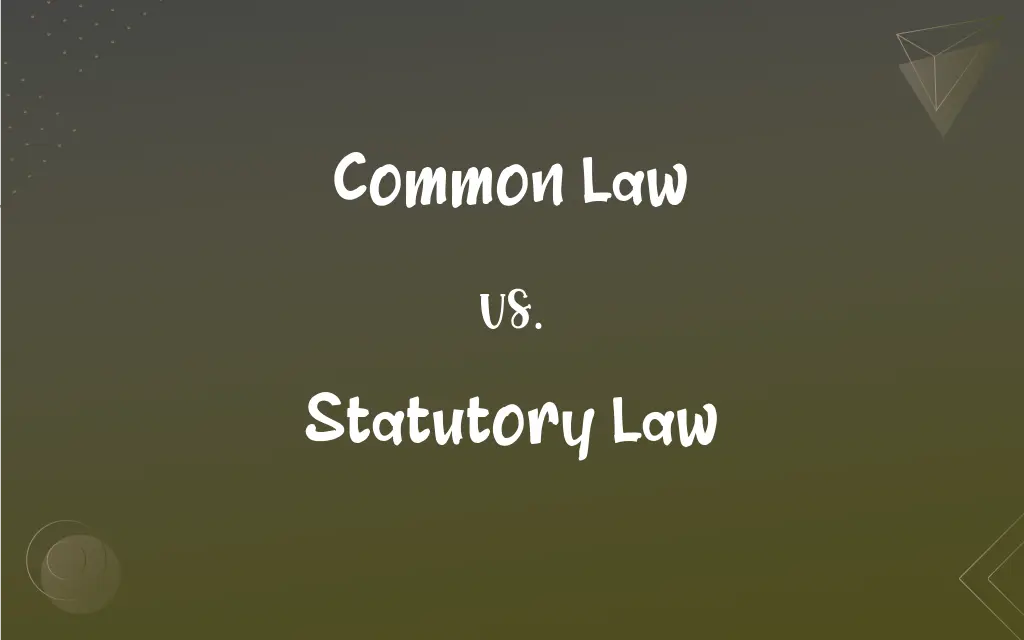Common Law vs. Statutory Law: What's the Difference?
Edited by Janet White || By Harlon Moss || Updated on November 18, 2023
Common law is based on judicial decisions and precedents, while statutory law is written law enacted by a legislative body.

Key Differences
Common law, originating from England, is a system where legal principles are derived from judicial decisions and case precedents. Statutory law, on the other hand, is formulated and written down by legislative bodies, resulting in statutes or acts.
A unique characteristic of common law is that it evolves over time, influenced by new decisions made by judges. Statutory law, however, remains static unless amended or repealed by the legislature.
Courts, when faced with cases where no statutory law applies, often rely on common law principles. Conversely, where there's a specific statute in place, statutory law takes precedence.
A strength of common law lies in its ability to adapt and change with societal values and norms. Statutory law, while potentially more rigid, provides clarity and certainty as it is explicitly written and codified.
It's noteworthy that both common law and statutory law coexist in many jurisdictions, with each playing distinct yet complementary roles in the legal framework.
ADVERTISEMENT
Comparison Chart
Origin
From judicial decisions and precedents
From legislative bodies
Evolution
Evolves over time
Remains static unless amended
Application
In absence of relevant statutes
Always applies where present
Flexibility
Adaptable to societal changes
More rigid, but offers clarity
Precedence
Can be overridden by statutory law
Takes precedence when in conflict with common law
ADVERTISEMENT
Common Law and Statutory Law Definitions
Common Law
A system based on judicial decisions.
In many jurisdictions, marriage laws evolved through common law before being codified.
Statutory Law
Needs a formal amendment process for changes.
Altering a statutory law often requires a majority vote in the legislative body.
Common Law
A dynamic system adjusting with societal changes.
Over time, common law recognized digital assets as a form of property.
Statutory Law
Can override common law principles.
When a new statutory law about digital privacy was enacted, it took precedence over any existing common law.
Common Law
Coexists with and complements statutory laws.
In absence of relevant statutes, judges often turn to common law for guidance.
Statutory Law
Provides specific rules and regulations.
Driving age is determined by statutory law in many states.
Common Law
Legal principles derived from case precedents.
The principle of negligence was shaped extensively by common law.
Statutory Law
Written law created by a legislative body.
The Clean Air Act is a piece of statutory law addressing environmental concerns.
Common Law
Originated from England's legal system.
U.S. legal traditions have roots in English common law.
Statutory Law
Known for its clarity and precision.
Statutory laws provide explicit guidelines on tax rates.
Common Law
Of, relating to, or based on common law.
Common Law
Of or relating to a common-law marriage.
Common Law
Of or pertaining to common law.
Common Law
Relating to common-law marriage.
Common Law
Based on common law;
A common-law right
FAQs
What is common law?
Common law is a legal system based on judicial decisions and precedents.
Which law takes precedence when common law conflicts with statutory law?
Statutory law takes precedence over common law when there's a conflict.
How is statutory law created?
Statutory law is created by legislative bodies, resulting in statutes or acts.
Can common law change?
Yes, common law evolves over time based on new judicial decisions.
Is common law only based on past decisions?
Primarily, yes. Common law is shaped by past judicial decisions and case precedents.
What's an example of a legal principle derived from common law?
"Negligence" in tort law is a principle largely shaped by common law.
How can statutory law be amended?
Statutory law can be amended through a legislative process, typically involving majority votes and sometimes additional procedures.
Can a new statutory law be influenced by common law?
Yes, legislators might look to common law principles when drafting new statutes.
How do judges use common law in their decisions?
Judges often reference past cases and their outcomes, using precedent to guide their decisions when no relevant statute exists.
What if a statute is unclear?
Courts may interpret the statute, and in doing so, might look to common law for guidance.
Why do some prefer the predictability of statutory law?
Statutory law offers explicit guidelines, making it easier for individuals and entities to understand their rights and obligations.
Is common law written down like statutory law?
While common law is documented in case law and court reports, it isn't codified like statutory law.
Why is statutory law considered more rigid?
Statutory law is explicit and remains static unless amended, making it more rigid compared to the evolving nature of common law.
Do statutes cover every possible legal scenario?
No, it's impossible for statutes to cover every specific scenario, which is why common law plays a complementary role.
How did common law originate?
Common law originated from England's legal system and was later adopted by countries like the U.S.
Is common law always based on fairness?
While common law often seeks fairness, it's primarily based on precedent, which may not always align with contemporary views of fairness.
Are all countries based on common law systems?
No, only some countries follow a common law system, while others might follow civil law, religious law, or a mix.
Are there areas where only statutory law applies?
Yes, certain areas, like tax codes or immigration laws, are predominantly governed by statutory law.
Can common law principles differ between jurisdictions?
Absolutely. Different courts can interpret and evolve principles differently over time.
What's the main advantage of statutory law?
Statutory law provides clarity and certainty, as it explicitly codifies legal principles.
About Author
Written by
Harlon MossHarlon is a seasoned quality moderator and accomplished content writer for Difference Wiki. An alumnus of the prestigious University of California, he earned his degree in Computer Science. Leveraging his academic background, Harlon brings a meticulous and informed perspective to his work, ensuring content accuracy and excellence.
Edited by
Janet WhiteJanet White has been an esteemed writer and blogger for Difference Wiki. Holding a Master's degree in Science and Medical Journalism from the prestigious Boston University, she has consistently demonstrated her expertise and passion for her field. When she's not immersed in her work, Janet relishes her time exercising, delving into a good book, and cherishing moments with friends and family.































































